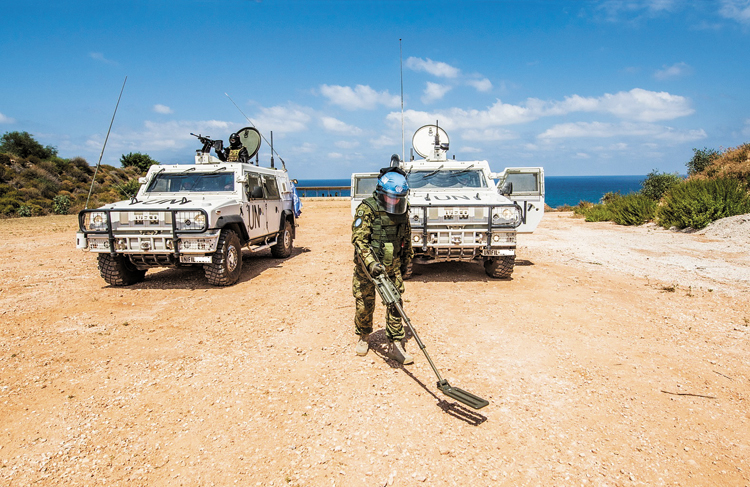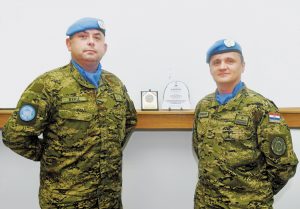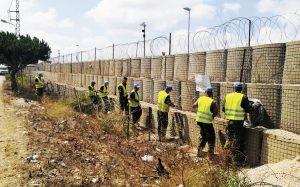The central marking of the Croatian Army and the Croatian Armed Forces Day and…
Everybody Wanted the Flag from Croatian Uniforms
 “As is usually the case when embarking on a mission for the first time, we had no idea what was expected of us. However, our stay was better than expected and our soldiers did a good job, judging from all the praise they received.” These are the words with which the Commander of the 1st Croatian Contingent in the peacekeeping mission United Nations Interim Force in Lebanon (UNIFIL) Major Željko Javorović and the Commander of the Engineer Company Captain Dražen Brkić describe their stay in Lebanon.
“As is usually the case when embarking on a mission for the first time, we had no idea what was expected of us. However, our stay was better than expected and our soldiers did a good job, judging from all the praise they received.” These are the words with which the Commander of the 1st Croatian Contingent in the peacekeeping mission United Nations Interim Force in Lebanon (UNIFIL) Major Željko Javorović and the Commander of the Engineer Company Captain Dražen Brkić describe their stay in Lebanon.
The contingent’s 52 members (two women and 50 men) resided in UN’s Base Sharma near Naqoura, on the border between Lebanon and Israel from April to November. Most of the contingent belonged to the General Engineer Support Company, which was a part of the Combat Support Battalion, commanded by Lieutenant Colonel Marco Arculeo from Italy.
As Major Javorović explains, there were three more nations in the Battalion, along with Croats and Italians: Hungarians, Austrians and Armenians. Most of the members of the Battalion were originally from the Alpine Brigade Julia. “The base itself was well furnished and equipped. Depending on the work structure and task schedule, our soldiers shared accommodation with members of other nations’ armed forces. There were various facilities in the camp: from sports facilities and a gym to a club with table football and table tennis as well as places of worship. Basically, we had everything we needed to live and work there,” Major Javorović describes. Apart from the Engineer Company, which was a part of the Combat Support Battalion, our soldiers also had individual tasks in the Battalion’s Headquarters. For example, Major Javorović worked there while simultaneously performing the duty of the Croatian Contingent’s commander.
The Croatian contingent’s main task was to support and protect forces, which in this particular case meant that our engineers performed tasks that were not unlike those that they perform at home, such as repairing, maintaining and expanding camps.
“We put in a lot of effort into raising the level of protection of the UN’s forces in the existing bases in the sector. Among other things, we built three side exits from the base that had not existed before, thus raising the security level to a higher degree,” Captain Brkić tells us. The fact that the Engineer Company conducted 82 % of the tasks planned for this year in terms of the forces’ protection speaks volumes about the quality of their work.
 However, alongside tasks typical of an engineering company, our soldiers were also engaged in security jobs and the provision of help to the local community. “We were involved in various projects that supported the co-operation between the civilian and the military community. We were granted specific objects in which we manufactured specific engineer components. One object was a carpentry workshop, while another object was a locksmith’s shop. Everything manufactured in those workshops was installed in the base or some civil institution,” Captain Brkić explains. For instance, one project they are particularly proud of is the construction of a wooden altar in the Chapel of Our Lady of Lebanon in Base Shama. They also collaborated with the Mosan Centre for Special Needs. That was an opportunity for our soldiers to get better acquainted the host nation, who embraced them with open arms.
However, alongside tasks typical of an engineering company, our soldiers were also engaged in security jobs and the provision of help to the local community. “We were involved in various projects that supported the co-operation between the civilian and the military community. We were granted specific objects in which we manufactured specific engineer components. One object was a carpentry workshop, while another object was a locksmith’s shop. Everything manufactured in those workshops was installed in the base or some civil institution,” Captain Brkić explains. For instance, one project they are particularly proud of is the construction of a wooden altar in the Chapel of Our Lady of Lebanon in Base Shama. They also collaborated with the Mosan Centre for Special Needs. That was an opportunity for our soldiers to get better acquainted the host nation, who embraced them with open arms.
“One of the most important projects for civil institutions that we worked on was a construction of wooden houses and houses for domesticated animals in the Mosan Centre for Special Needs. We got closer to the local population in such situations. Further, we had workshops with children in which we manufactured interesting objects with hand tools. A language barrier existed, but we always had an interpreter with us. We enjoyed immense popularity because we participated in the mission during the World Football Championship and our team’s successes in football made us recognizable. Our football player’s jersey were being sold on the local marked, so we bought them and gave them to the children at the centre since they were all mad about Luka Modrić. We did not have enough flags on our shoulders; the children took them all from us because they wanted to have something that belonged to us. Football helped us bond with them,” Captain Brkić says. He adds that the hosts had a positive attitude towards them and that the members of the 1st Croatian Contingent felt at home in Lebanon. However, football was a taboo topic when conversing with Italians, Captain Brkić recalls.
“Since Italians had failed to qualify to the World Football Championship, football was a taboo topic. Whenever we had a meeting or a presentation, we were allowed talk about everything, bur for football,” Captain Brkić laughs.
Apart from collaborating with the Mosan Centre for Special Needs, the members of the 1st Croatian Contingent also held presentations about the threat of land mines to children, which were rather useful, given that the children live in security-wise unstable areas. Also, their task was to check the terrain for potential mines and explosive devices before the start of any activity. However, no incidents occurred in Lebanon during their stay, Major Javorović emphasizes.
“It is important for us to teach the children how to react should they find a suspicious object or an explosive advice. They had already known all of that because they live in risk areas, but it does not hurt to warn them again. For them, it was something new and interesting. In the end, when you return from the mission, you know that you have done something good,” the contingent’s commander says.
 Since this was the first Croatian contingent to participate in the mission in Lebanon, we ask Major Javorović and Captain Brkić if there were any unforeseen situations and if the contingent had been well prepared for the mission. Both readily respond that there is no difference between performing military engineering tasks at home and doing the same job in a mission. The contingent had had two pre-deployment training sessions with the Italian forces. The first session had been conducted in a simulation centre in Italy with the Command of the Combat Support Battalion, while the members of the 1st Croatian Contingent had got acquainted with the equipment and the resources used in the area of the mission during the second session.
Since this was the first Croatian contingent to participate in the mission in Lebanon, we ask Major Javorović and Captain Brkić if there were any unforeseen situations and if the contingent had been well prepared for the mission. Both readily respond that there is no difference between performing military engineering tasks at home and doing the same job in a mission. The contingent had had two pre-deployment training sessions with the Italian forces. The first session had been conducted in a simulation centre in Italy with the Command of the Combat Support Battalion, while the members of the 1st Croatian Contingent had got acquainted with the equipment and the resources used in the area of the mission during the second session.
“We demonstrated our capabilities and practised working with trucks and as well as other machines and vehicles there. These machines belonged to the Italian Engineer Corps. All vehicles we normally work with were at our disposal: excavators, loaders, bulldozers, combination vehicles, etc.,” Captain Brkić explains. Major Javorović concludes: “In Lebanon, we performed the same tasks as at home. We all knew what our job was and we received commendations for it, so we know we did something good. When engineers do something, they always leave a mark behind them and that is exactly what happened in Lebanon.”
The members of the 1st Croatian Contingent passed the knowledge and experience gained in the mission onto their colleagues in the 2nd Croatian Contingent, who were deployed to Lerbanon in the middle of October.
“Wherever you are deployed, you find yourself in a new situation. We soaked information along the way and adjusted. I have no doubt that the members of the 2nd Croatian Contingent will do their job in the mission as well as we did, if not even better than us,” Major Javorović concludes.
Text by MARTINA BUTORAC
Photo by TOMISLAV BRANDT, 2ND CROATIAN CONTINGENT
